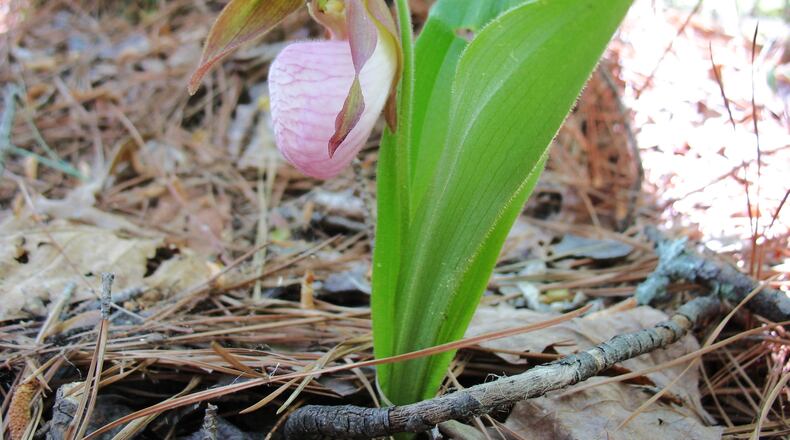Q: I recently came across a patch of 100 or so lady’s slippers located in the woods on private property. I have read that these beauties are on the endangered species list. I’m wondering if it would be OK/legal for me to pull a couple up. Dixie Doodle, email
A: Ellen Honeycutt, board chair of the Georgia Native Plant Society, says: “Pink lady’s slipper (Cypripedium acaule) is an uncommon native orchid that is vulnerable to pressures associated with habitat loss in Georgia. It requires special mycorrhizae conditions in the soil to grow and survive. Plants that are moved rarely live more than a couple years unless those soil conditions are already present in the new area. The Georgia Native Plant Society occasionally works with the Georgia Department of Natural Resources to relocate pink lady’s slipper plants in areas being developed, only moving those which would otherwise be destroyed. We would encourage folks with plants on private property to enjoy them where they already are, as moving them can diminish them. Of course, any plant on private property should only be moved with permission from the property owner.”
Q: We planted a beautiful cherry tree last year. We were diligent about watering and it thrived. This spring, sadly, it had a few blossoms but it failed to leaf out. If I scratch a branch with my fingernail, it is green underneath. Should I wait to see what happens? Linda Chesbro, Barrow County
A: If your cherry tree has no leaves at this time, it is dead. Even though you found green tissue in late spring, it will soon dry out and become brown. Replace it!
Q: In the small planter spot on the backside of my townhome, I have two small hostas. The area gets morning sun and then is in the shade the rest of the day. Year over year, both hostas sprout on schedule, but then wilt away quickly. This year’s plants are already developing pale tan patches on some of the leaves. What could be causing this? Cliff Lummus, south Cobb County
A: I think you’re dealing with anthracnose. Because anthracnose relies on water to spread, control starts with smart gardening habits. Give plants plenty of room and good air circulation, and avoid overhead watering to limit wet leaves. Be sure your management of the plants, such as watering and fertilizing, is correct. Then use Infuse (propiconazole) fungicide according to label directions.
Email Walter at georgiagardener@yahoo.com. Listen to his occasional garden comments on “Green and Growing with Ashley Frasca” Saturday mornings on 95.5 WSB. Visit his website, walterreeves.com, or join his Facebook page at bit.ly/georgiagardener for his latest tips.
About the Author
Keep Reading
The Latest
Featured

